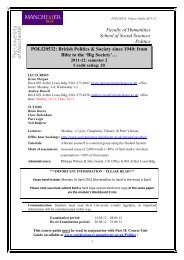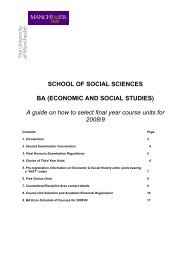CHNN 22, Spring 2008 - School of Social Sciences
CHNN 22, Spring 2008 - School of Social Sciences
CHNN 22, Spring 2008 - School of Social Sciences
You also want an ePaper? Increase the reach of your titles
YUMPU automatically turns print PDFs into web optimized ePapers that Google loves.
Jim Riordan: The Last British Comrade Trained in Moscow: The Higher Party<br />
<strong>School</strong>, 1961–1963. <strong>Social</strong>ist History Society. SHS Occasional Paper No. 23. 2007.<br />
34pp.<br />
C<br />
ompared to the 1920s and the 1930s, little is known about the post-war practices <strong>of</strong> Soviet<br />
party education for foreign communists. Through the Soviet era, party education was the<br />
most central means in creating and maintaining ideological dependence between<br />
communist parties. Another may have been the financial support from Moscow.<br />
In total, only a single cohort <strong>of</strong> five British attendees were trained at the post-war Higher Party<br />
<strong>School</strong> (HPS), Moscow, in the early 1960s. Pr<strong>of</strong>essor Emeritus Jim Riordan has written his<br />
personal account on his time at the HPS. One <strong>of</strong> the others contributed by giving his diary to the<br />
author, but he did not want his name mentioned. The rest <strong>of</strong> the British ex-students kept quiet.<br />
Riordan explains the uniqueness <strong>of</strong> his British HPS course by stressing how far it differed from the<br />
traditional lack <strong>of</strong> appreciation with theoretical marxism-leninism or the orthodox way it was<br />
taught in Moscow. This critical attitude, combined with disobedience which led to troubles with the<br />
HPS’s <strong>of</strong>ficials, led to one British comrade being sent back home after his first year. Another reason<br />
for such low numbers <strong>of</strong> British students at the HPS, suggested by Betty Reid, was the fates <strong>of</strong> the<br />
unlucky British communists that had taken the Soviet passport during the 1930s.<br />
‘No doubt the <strong>of</strong>fer was there, but it was not taken up again’, says Riordan. It is hard to believe that<br />
the unsuccessful five caused the CPGB to curtail involvement with this free education programme.<br />
More information is needed to explain why the training at the HPS started in 1961, and why it did<br />
not continue. As, for comparison, the Finns remained at the HPS since they got in (1954) until the<br />
end <strong>of</strong> the 1980s – and the comrades that were destroyed in the Stalin purges <strong>of</strong> the 1930s were not<br />
counted in tens but thousands.<br />
In Moscow, Riordan was driven to the Vysshaya partiynaya shkola in a black limousine. On the<br />
wall <strong>of</strong> the accommodation room, he was welcomed by an image <strong>of</strong> Stalin that was removed from<br />
there, as well as from the Lenin mausoleum, a month later. However, the Soviet students at the<br />
HPS, about the half <strong>of</strong> the total, were not able to debate politics or Soviet history, not to mention<br />
the purges: ‘it was like arguing with a religious fanatic’. Riordan’s pride in being there was even<br />
more questioned by ordinary Muscovites that reacted to his introductions with indifference or<br />
hostility. He had become a member <strong>of</strong> the ruling party elite.<br />
Riordan describes the classes at the HPS as well prepared and illuminating. However, the British<br />
students could not swallow the fabricated Soviet history that they knew to be ‘utter tosh’. Soon<br />
their protests had reached the Soviet Party Central Committee. After a couple <strong>of</strong> serious<br />
discussions with some British comrades they respected, the renegades promised to play according<br />
to the rules. Riordan concludes that HPS never succeeded in moulding him into a reliable soldier <strong>of</strong><br />
revolution.<br />
Riordan did not draw radical conclusions either but worked in Moscow for a couple <strong>of</strong> years at the<br />
Progress Publishing house. He describes the extraordinary British society in Moscow, including the<br />
members <strong>of</strong> the famous ‘Oxford circle’. Riordan hints, in passing, that prolonged time in Moscow<br />
was an eye-opener, especially when he was ridiculously accused as an anti-sovietchik before<br />
leaving the country. Back home, he tried idealistically to explain the distortions <strong>of</strong> ‘real socialism’<br />
to the British comrades who branded him, again, as a heretic. Riordan never left the Communist<br />
Party – it left him in 1991.<br />
Because <strong>of</strong> Riordan’s later academic career in Russian studies, his personal memoirs are brilliantly<br />
placed into the Soviet historical context <strong>of</strong> the time. He writes sharply, with British irony. However,<br />
I would have liked to read more details about the culture and practice <strong>of</strong> the HPS; the publication<br />
consists only <strong>of</strong> 34 pages, and it includes some other short life stories too.<br />
Joni Krekola, University on Helsinki<br />
55
















